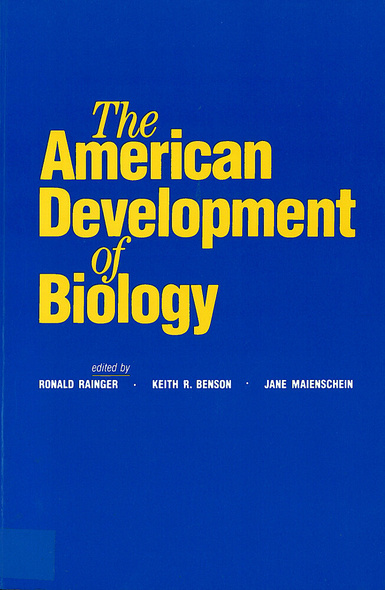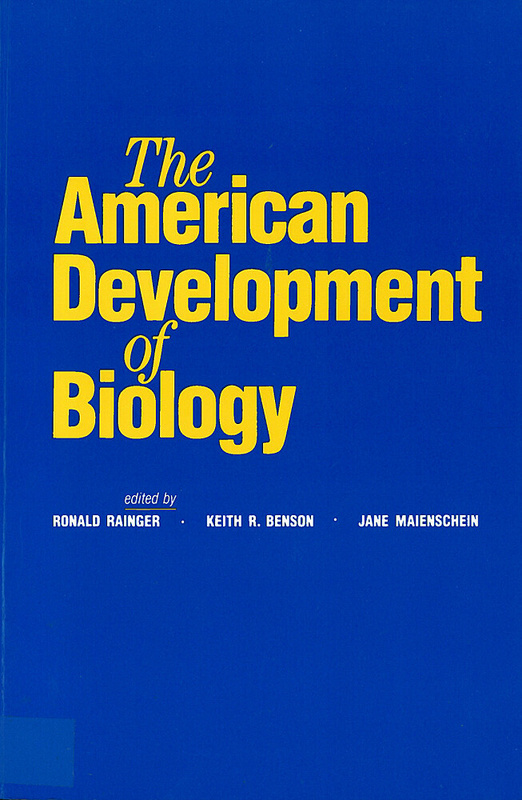The American Development of Biology
Edited by Jane Maienschein and Ronald Rainger
Rutgers University Press
The papers in this volume represent original work to celebrate the centenary of the American Society of Zoologists. They illustrate the impressive nature of historical scholarship that has subsequently focused on the development of biology in the United States.
Intelligently organized and presented... the essays bespeak the expansion in recent years of the study of the history of biology... beyond the pure history of ideas to include social, economic, and institutional context and its shaping influence on scientific research programs.
Fills in gap and sets the record straight concerning the diversity, the complexity, and the general richness of biological theory and practice in the late nineteenth and early twentieth centuries.
History of science at its modern best.
RONALD RAINGER is an assistant professor of history at Texas Tech University. He has published a number of articles on the history of anthropology and paleontology and is the author of An Agenda for Antiquity: Henry Fairfield Osborn and Vertebrate Paleontology at the American Museum of Natural History, 1890–1935.
KEITH R. BENSON is an associate professor of medical history and ethics at the University of Washington. He has published papers on biology at Johns Hopkins University, the American natural history tradition, and the history of marine biology.
JANE MAIENSCHEIN is a professor of philosophy and zoology at Arizona State University. She is the editor of Defining Biology: Lectures from the 1890's and has recently completed Transforming Traditions in American Biology, 1880–1915.
KEITH R. BENSON is an associate professor of medical history and ethics at the University of Washington. He has published papers on biology at Johns Hopkins University, the American natural history tradition, and the history of marine biology.
JANE MAIENSCHEIN is a professor of philosophy and zoology at Arizona State University. She is the editor of Defining Biology: Lectures from the 1890's and has recently completed Transforming Traditions in American Biology, 1880–1915.
Frontmatter
Contents
Contributors
Preface
Introduction
Part One. Natural History to Biology
1. Museums on Campus: A Tradition of Inquiry and Teaching
2. From Museum Research to Laboratory Research: The Transformation of Natural History into Academic Biology
Part Two. Centers of Cooperation
3. Organizing Biology: The American Society of Naturalists and its "Affiliated Societies," 1883-1923
4. Summer Resort and Scientific Discipline: Woods Hole and the Structure of American Biology, 1882-1925
5. Whitman at Chicago: Establishing a Chicago Style of Biology?
Part Three. Working at the Boundaries of Biology
6. Charles Otis Whitman, Wallace Craig, and the Biological Study of Animal Behavior in the United States, 1898-1925
7. Vertebrate Paleontology as Biology: Henry Fairfield Osborn and the American Museum of Natural History
8. Organism and Environment: Frederic Clements's Vision of a Unified Physiological Ecology
9. Mendel in America: Theory and Practice, 1900-1919
10. Cellular Politics: Ernest Everett Just, Richard B. Goldschmidt, and the Attempt to Reconcile Embryology and Genetics
Bibliography
Index
Contents
Contributors
Preface
Introduction
Part One. Natural History to Biology
1. Museums on Campus: A Tradition of Inquiry and Teaching
2. From Museum Research to Laboratory Research: The Transformation of Natural History into Academic Biology
Part Two. Centers of Cooperation
3. Organizing Biology: The American Society of Naturalists and its "Affiliated Societies," 1883-1923
4. Summer Resort and Scientific Discipline: Woods Hole and the Structure of American Biology, 1882-1925
5. Whitman at Chicago: Establishing a Chicago Style of Biology?
Part Three. Working at the Boundaries of Biology
6. Charles Otis Whitman, Wallace Craig, and the Biological Study of Animal Behavior in the United States, 1898-1925
7. Vertebrate Paleontology as Biology: Henry Fairfield Osborn and the American Museum of Natural History
8. Organism and Environment: Frederic Clements's Vision of a Unified Physiological Ecology
9. Mendel in America: Theory and Practice, 1900-1919
10. Cellular Politics: Ernest Everett Just, Richard B. Goldschmidt, and the Attempt to Reconcile Embryology and Genetics
Bibliography
Index






